How American Mom's 'One-Month Sit' with Confinement Nurse Changed Her Postpartum Experience in Hong Kong (Exclusive)
The new mom found the 24/7 help allowed her to focus on the important things in the early days of motherhood
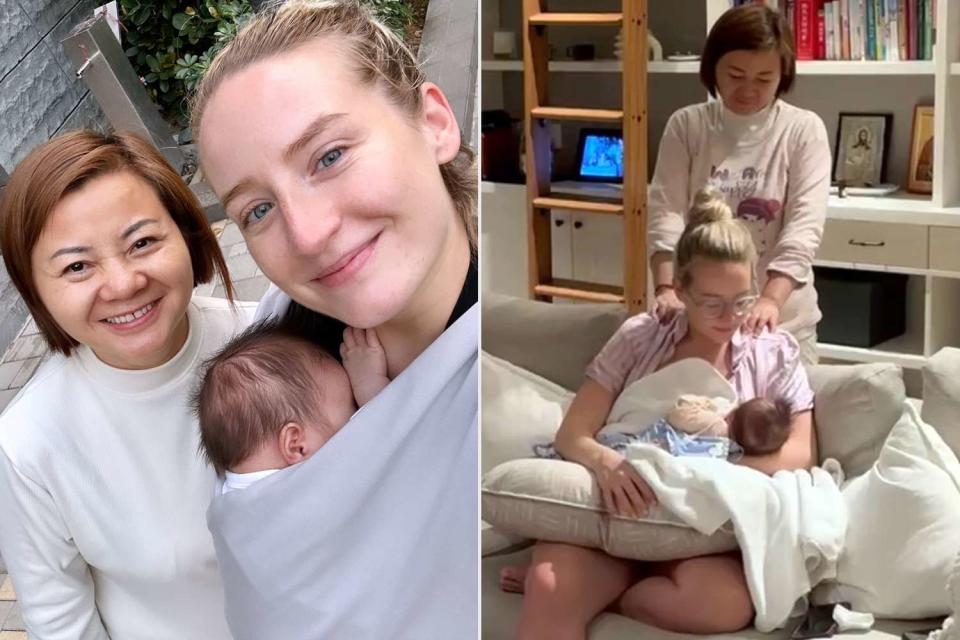
Courtesy of Anastasia Koss
Anastasia Koss with her baby girl and her confinement nurse (left), Anastasia's nurse massaging her as the new mom breastfed her baby girlAnastasia Koss, originally from the U.S., has lived abroad since 2016
Koss and her husband decided to get a postpartum confinement nurse ahead of the birth of their daughter in February
Koss tells PEOPLE that the postpartum help allowed her to bond with her baby and focus on recovery
Anastasia Koss is grateful of the help she's received in her motherhood journey.
The content creator and singer, who goes by @ak_mao on TikTok, was born in Pennsylvania and grew up in New York, spending many years living there before moving to Shanghai in 2016.
"I was studying Chinese and also teaching," she tells PEOPLE. "I've always been really interested in learning Chinese. China also has a very big entertainment industry, so I was also doing work as a content creator and singer."
After time in Beijing and a return to New York, the end of 2021 saw Koss move to Hong Kong with her husband. The pair split their time between Hong Kong and mainland China. She continued sharing her life on social media while also working as a singer and actress. These days, Koss is on both American and Chinese social media networks.
On TikTok, Koss documented her postpartum experience, in which she decided to do the "Chinese one month sit."
"My husband was the one who first suggested that I go through this one-month Chinese postpartum confinement period. He knows that it's in his culture and it's really good for women. So he suggested it and I was really interested because I have a lot of friends who have also gone through this one-month sit."
The more that Koss learned about how the process worked, the more she found "I was really fascinated by it."
"We don't have any friends or family living in Hong Kong, so I knew that I needed the support. I can't just have my mom come over and cook me a meal. We have nobody here. So it was a really good plan that we had for me postpartum, and it worked out beautifully."
Never miss a story — sign up for PEOPLE's free daily newsletter to stay up-to-date on the best of what PEOPLE has to offer, from juicy celebrity news to compelling human interest stories.
The conversations came halfway through Koss' pregnancy with their first baby, who was due at the end of February.
"We looked through our options and tried to figure out, 'What is this going to look like?' We discussed having family and friends that could come help but then we realized, even if we had anyone come, how helpful can they be? If they're coming to visit us, we still essentially have to host them."
Koss felt it was too "vulnerable" of a time to take that on, especially considering her husband got just one week of paternity leave. At that point, they realized the one-month sit would be the best help.
"You won't see women in mainland China or Hong Kong going out with a 2-week-old for lunch. It just doesn't happen, it's a known fact. For that first month or two, you definitely stay in and nurture yourself and bond with your baby," she says.

Courtesy of Anastasia Koss
Anastatsia KossWith that in mind, Koss' husband began the search. "They have agencies all around Hong Kong that help you find a confinement nurse. We interviewed a few people to share our situation before we chose one that fit for us."
Koss picked a nurse after just one interview.
"We had one interview and we really liked her. These women are trained in everything — as lactation specialists, in cooking, child care, CPR."
Once hired, the nurse "knows about the due date or if you're having a scheduled C-section. So they know not to have other clients around that due date since she would be joining our family for the confinement period," says Koss.
"At first, it was definitely hard for me to get over the idea that, 'I just came home from the hospital, I have a baby and then a couple of hours later, a complete stranger comes into my house and is helping me massage my engorged breasts,' " Koss says. "We went from 0 to 100. I would say it took 10 days or so for me to get used to having someone around all the time."
Koss welcomed her baby girl and had a "pretty standard" recovery.
"It's very exhausting for anyone going through that, so it's nice to have someone around to help with cooking and cleaning. I think doing this one-month sit definitely helped me a lot, physically and mentally. I could take that time to really relax and bond with my baby and get breastfeeding down without having to worry about bouncing back or going back to work."
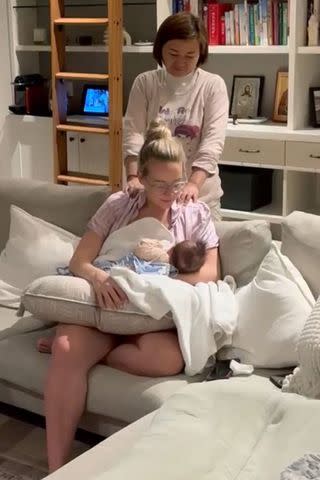
Courtesy of Anastasia Koss
Anastasia Koss gets a massage from her nurse as she breastfeeds her baby girlKoss' family opted to have the confinement nurse in their home around the clock for two months, during which time they established a routine.
"For me, I'm exclusively breastfeeding, so she's assisted me with that. She taught me a lot and helped with engorgement and massage in those early days to increase milk production. She was cooking four meals a day for me and was next to me at every feed, helping me out. She taught me how to use a breast pump and showed us how to bathe the baby," she says.
"Some confinement nurses do sleep with the baby, but I didn't want that. The baby slept next to me, and then during the night, if I needed water or help with a diaper change, I'd call the nurse from the other room."
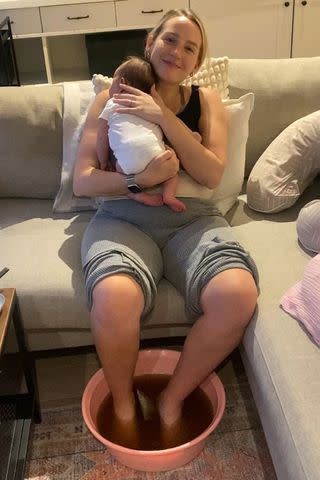
Courtesy of Anastasia Koss
Anastasia does a traditional footbath as she holds her baby girlKoss says her friends in the States "didn't really understand" the practice at first, but she took the time to explain the cultural significance and how it's a tradition in China.
"Some people were like, 'You don't need that, do you?' They thought it was weird. But afterward, they saw how happy I was and how me and my husband and the baby were all thriving. I think it changed their minds, but they definitely thought it was a bit odd and over the top initially."
Still, the new mom felt good knowing that her and her husband's "new parent anxiety" could be easily managed with the help of the nurse.
"I would say a lot of new parents, me and my husband included, we have that new parent anxiety, right? There's some stuff you don't know how to do and I think just having her there brought us a lot of comfort as well, because if there was something we had a question about, there's always someone you can ask," she says.
"You have a sense of security and that was something that I didn't foresee. So, at first, I would say it was a little bit difficult but then I realized, 'I do need help.' I think a lot of women are forced to bounce back or go back to work early."
She continues, "Truly, postpartum recovery is no joke. You're so hormonal. Your body just went through something massive and now there's huge life shifts. I feel emotionally, it was really nice to have someone there, especially because my husband's paternity leave was so limited that I just felt like there's no way I could have been alone every single day."
Koss acknowledges, "My postpartum experience is very different here than probably what I would have received in the U.S. I think that's why the response for the video has been pretty big," she says of the Tiktok, which has over 2.5 million views.
"To me, this process was really positive and shed a lot of light on how important postpartum health is. The amount of comments on the video where people say, 'I wish I had this in the U.S.,' but also, on the other hand, there were people saying, 'Oh, we do the same thing in Mexico.' 'We do the same thing in Nigeria.' They share each culture's postpartum tradition and it's so interesting to see the different parts of the world and how they handle this period."
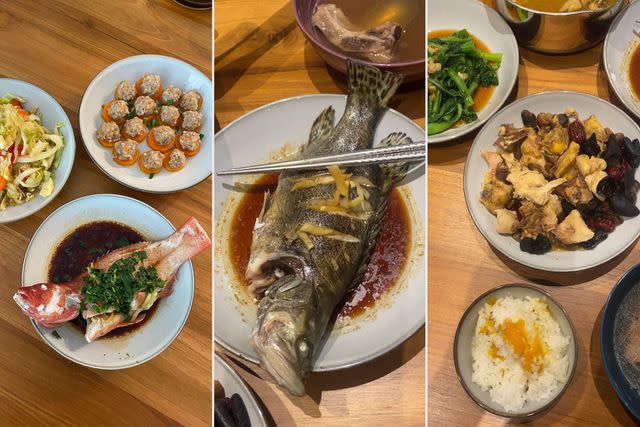
Courtesy of Anastasia Koss
Dishes Anastasia's nurse was cooking for her"I would say a lot of women in Hong Kong that I've spoken to have had a confinement nanny. Not every single woman can afford that, but if they don't have a confinement nanny, it's generally their mom or grandma or aunt who helps them with this process and cooks for them and stays with them."
"The pricing for the confinement nurse really varies, depending on how hands-on your [nurse] is, but ours cost ... around $3,800."
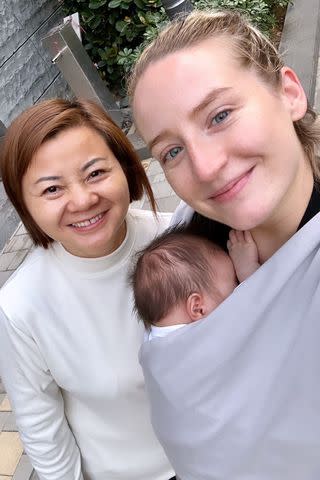
Courtesy of Anastasia Koss
Anastasia Koss smiles with her confinement nurse and her baby girlWhile confinement nurses are much more prevalent in Hong Kong, Koss notes that in mainland China and Korea, they have confinement centers for postpartum recovery.
"It's very normalized in Korea and China that people go to these 'postpartum hotels.' I think people see that in the U.S. and it's like, 'That's such a luxury.' The cultural background of the tradition where it stems from is significant," Koss says.
For more People news, make sure to sign up for our newsletter!
Read the original article on People.

